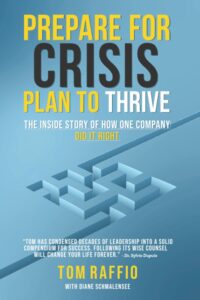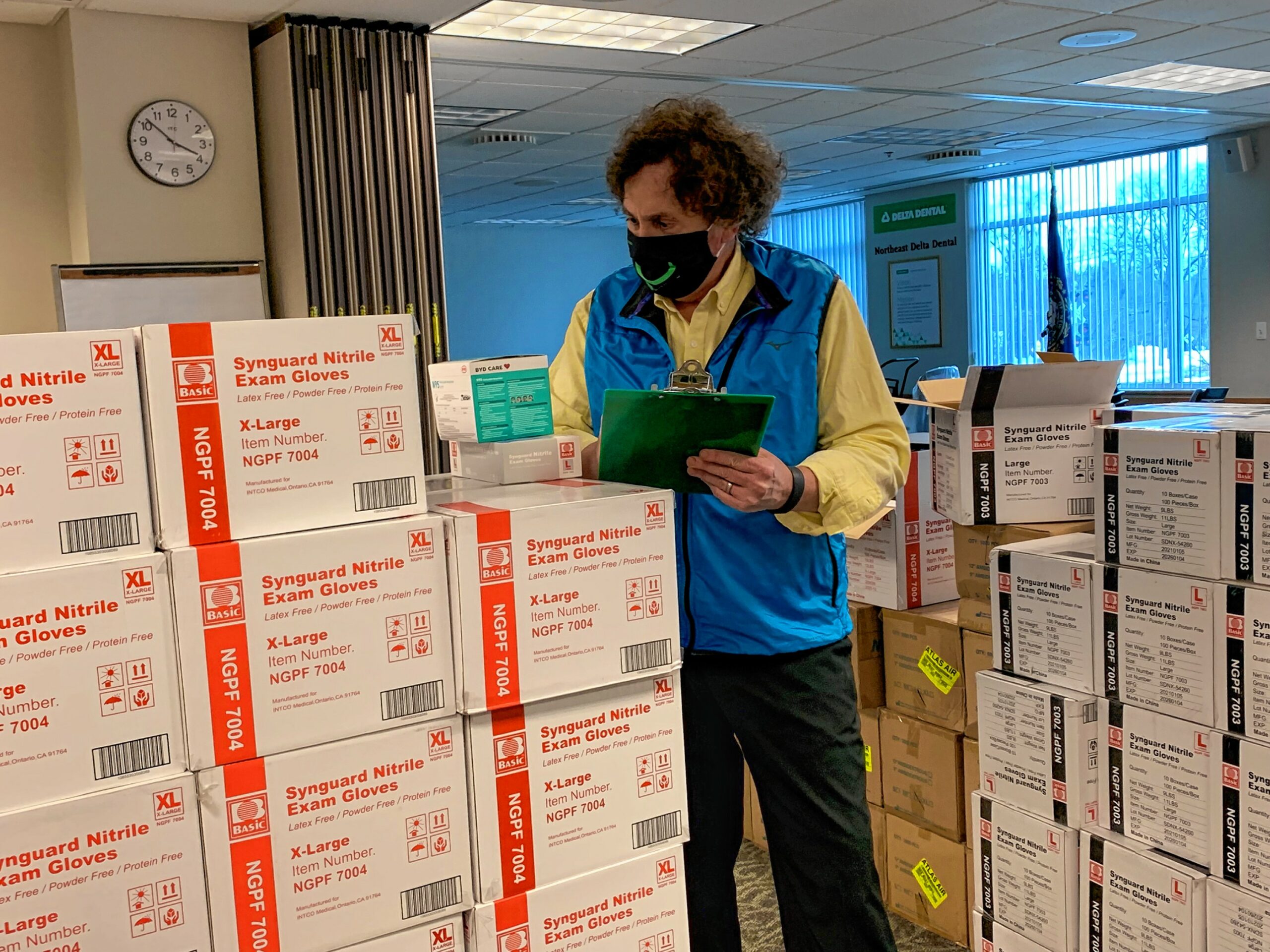Like most of us, Tom Raffio was a little slow to recognize COVID-19 for what it ultimately became – a pandemic that would challenge our businesses and our institutions like never before. In fact, Raffio, an avid basketball fan, was at a packed TD Garden watching the Boston Celtics just days before we’d all retreat to the sidelines.
 Though Raffio didn’t necessarily recognize the signs of this specific pandemic in March 2020 – really, who did? – he did have one major advantage. Raffio and the leadership team at Northeast Delta Dental, headquartered in Concord, had spent significant time and thought on building out crisis plans for a host of potentially disastrous events, including a pandemic. So, once the lockdown hit, Raffio, like a veteran basketball coach, already had the next few plays drawn up.
Though Raffio didn’t necessarily recognize the signs of this specific pandemic in March 2020 – really, who did? – he did have one major advantage. Raffio and the leadership team at Northeast Delta Dental, headquartered in Concord, had spent significant time and thought on building out crisis plans for a host of potentially disastrous events, including a pandemic. So, once the lockdown hit, Raffio, like a veteran basketball coach, already had the next few plays drawn up.
Now, Raffio has written the book on how businesses can prepare for the next major challenge, whatever that may be. While he references the principles of the Baldrige Excellence Framework, a system that has helped guide his career, readers of the book, “Prepare for Crisis, Plan to Thrive,” can easily get a game plan for how preparation can put them a step ahead and build a more robust business, even if that crisis never hits.
Around Concord publisher Steve Leone sat down with Raffio in February to discuss the book, what readers can learn and what a post-pandemic business climate will look like. The interview was edited for clarity and length.
Around Concord: I first want to get to your concept of even writing this book. And I assume it’s probably because we all have a hard time even conceptualizing a crisis. Why do we all have such a hard time preparing for a crisis?
Tom Raffio: Well, until recently, probably because it seems so theoretical. And even with us, we had literally prepared for a pandemic and crisis. The train line that goes by behind the building here carries dangerous cargo. So it’s probably a little less theoretical for us. I’m not here to say that I predicted COVID, but we actually had planned for the pandemic including buying surgical masks, which of course we then gave away to Dartmouth Hitchcock. So I think it’s because it’s so theoretical that people have a hard time planning for something that they think is so, so unlikely. I think that’s going to change now because people know that a biological crisis is real. I think the value of the book is for the next crisis. I actually believe it’s going to be a major cyber crisis. And so I think now people are seeing that crises are real.
When we were doing our disaster recovery exercises, we have a backup site in Manchester and we’d go through the whole thing on a weekend and even for us, sometimes it was like, you know, do we really have to go through the full nine yards in terms of preparation? But we did and because we did, including building up our financial reserves, we were in a way better spot to pivot and succeed and give back money to the community and succeed ourselves.
AC: In your book, you present what you did right, but you also note that you didn’t see everything coming. How could you? A lot of it is really thinking on your feet. One thing that struck me as an interesting anecdote was that before the pandemic you identified that you needed a new computer system able to handle remote work. So you put in your order. Then the pandemic hit and the phone hadn’t arrived yet.
TR: It was frustrating because we knew we needed an automatic call distribution system that customer service reps could do from home. Anybody can take a call from home but the challenge is, if you have 25 people, it has to go to the next available agent. They have to be set up. Our customers want statistics on how fast you’re answering the phone. So we knew we needed that because we have a great call center here. But obviously, if people were working from home, we’d be in trouble. So we planned for it. It’s just that instead of arriving in March when the pandemic hit, it arrived during the summer. So what we did was we had the 25 people in customer service spaced out because by then because everybody else was working from home. So we knew that but it still comes down to timing and we were a few months late. But once it got installed, our numbers are incredible, they’re better than ever. I don’t know how you’ve experienced either calling your utility or bank or credit card company. Now, we went the other way, which was faster and more expeditious. And that’s because of the phone system.
AC: I think if somebody back in 2018 said, ‘you know, we really need to prepare for a pandemic,’ I would hope I would have listened. You mentioned cybersecurity as something that we need to be watching out for. What should people be doing around cybersecurity, and why cybersecurity?
TR: Well, we know, of course, biological crises are real. And so I think now people are hopefully prepared for that. Hopefully, they’ve outfitted their companies with surgical masks, they have a pandemic committee – we have a pandemic committee that meets regularly, daily for a long time, monitoring the statistics and so forth. So I think we’ve gotten that to the point where if there’s another biological crisis or omicron, I think we’re well situated.
I think that I’m just seeing already the millions of dollars that we spend to fight current scams and making sure that there are no HIPAA violations. I think that is still the biggest exposure point because I think it’s staying one step ahead of the bad guys in terms of cybercrime. We spent millions of dollars as do a lot of companies just trying to do that. I just kind of feel whether it’s by another country, or whether it’s just creative Americans with time on their hands, I do think that’s going to be the next super crisis.
It’s going down to the smaller employer level as well. I do think most companies are making the necessary investment in cybersecurity software, but a lot of it honestly comes down to employee education too. I know sometimes myself, when I get an email, I’m thinking, ‘okay, this is just a test?’
AC: You’re a pretty big company around these parts. So you have a lot of resources that your one-person or five-person company doesn’t have. That means you’re able to invest a lot of time into preparation for a crisis. What advice would you have for a really small business?
TR: We use the Baldrige Performance Excellence standard. And I get this question a lot because I’m doing a lot of stuff for what’s called Excellence North Alliance, which is the state’s version of the Baldrige. And I always say that whether you’re a company of five or you’re 250, like us, the basic principles of strategic planning, the human side of the enterprise servant leadership, still apply. The best example, I think, of a small organization using Baldrige is Dancing Lion Chocolate on Elm Street in Manchester — the proprietor Richard and two or three other people. That’s their whole company, but they use the Baldrige framework, including disaster recovery planning. And they’re thriving. So any company large or small can follow this book and you won’t be in a position of saying, ‘Well, I can’t do what Delta Dental did.’ You can, actually.
AC: Communication is obviously very big in what you do. And you know, there’s a lot of vulnerability there. You’re communicating about things you’re uncertain about. How do you balance the honesty that people are looking for with the confidence that you’re trying to project in difficult situations?
TR: Well over 400 daily emails have gone to our employees, well over 100 to our dentists. Many, many others to other stakeholders. And what I learned is people want you to be human, which is why I started to include pictures of my granddaughter, and then people loved that. So it’s a balance. People want to know that our future is bright, but they also want the realistic view. So we actually had to lay people off because between March 16 and May 11 of 2020, you could not go to the dentist.
What everybody wanted to know is ‘will the future be okay?’ Once we worked with the governor’s office to get the dentists back up and running, I could tell the furloughed employees that ‘hey, as soon as the claims start coming back in, you’ll be coming back in and getting re-employed.’ So servant leadership is you want to be realistic and define reality. You want to be human, but you have to, obviously if it’s warranted, give a dose of optimism.
AC: The pandemic forced people to find a different way. When you’re preparing for these crisis moments and going through the discovery, are there things you found you can apply without actually having to go through the crisis?
TR: Definitely. We were going to buy that new phone system regardless of whether COVID-19 ever hit. When you go through disaster recovery, you uncover things that you just automatically do for continuous improvement. Remember Y2K? Everybody thought the world was gonna end so all these systems enhancements occurred in 1999, which ultimately, weren’t needed for Y2K, but made the systems better for like the first five years of the new century. So I think that’s what basically happens when you really do prepare for a crisis. And the other thing is we built up our reserves. So without affecting our vitality, we could give back almost $20 million to our customers so they didn’t have to worry about paying their premiums.
A lot of companies were in trouble. And the last thing we wanted them to do was to drop dental coverage. Here’s how I thought of it: we got our employees safe. Then we gave the dentists $7 million so they can keep running. When they weren’t seeing patients we gave them free PPE. Okay, so now they’re up and running, but if nobody goes to the dentist because employers have dropped dental insurance, what’s the point of that? Then we gave the premium holidays for a total of $19 million. So people then flocked back to the dentist. But we wouldn’t have been able to do it had we not built up the reserves. For 10 years we built our reserves, well over statutory requirements, because it would allow us to make this pivot, which we wouldn’t have been able to do.
AC: Your book mentions working from home and that’s probably among the most useful things for businesses to consider, how do we approach this? What advice would you give to business owners on this seemingly simple yet incredibly complex question of how much work from home do you allow?
TR: Well, there’s no one size fits all. Obviously, if you’re running a restaurant, most if not all the employees need to be on site. If you’re in an industry like ours, the hybrid options work. So my advice is, get your employees engaged in the process.
What I worry about is not current and even next year, but it’s more like four years from now because the reason why we’re a juggernaut in terms of service is we all know each other, we’ve all grown up together. But during the last 18 months, we’ve hired five or six people who I’ve just literally met in the parking lot. So 10 years from now, when maybe 40% of your company are people that you hired virtually, are you going to have that same level of trust? So I think you constantly have to revisit it to make sure that you’re keeping the culture. I think you want to constantly be doing a climate survey of your employees just to see what they’re thinking, what their mental health is.
Another thing I worry about is people who are established in their career, like age 40, 50, 60, for them working remotely might be actually really cool. You put in a load of laundry and cut back on the commute, do some work, walk your dog. But if you’re like 30, you used to just stick your head in my office for visibility and things like that. All that has now gone away. So if you have to look at this, what are you going to do to make sure to keep your culture? You may need to start bringing people back in, just so they can connect with you as leadership.
AC: It almost sounds like a crisis in itself. If you really value culture and culture is essentially the defining principle of your company, well, there’s no quicker way to start eroding your culture than not being in the same room.
TR: There’s a famous business person that said culture trumps everything. And clearly, culture has changed during the pandemic. If you’re not seeing people, ultimately that’s going to come back to bite certain organizations.
AC: What should businesses be doing to think beyond their own immediate financial goals, thinking about their community?
TR: Servant leadership is all about giving back to the community. And people want to do business with companies small or large that they know give back to the community. So even if you’re a small employer, you still need to give back to the community because your customers are looking at that too. Whether you’re a company of five people in dry cleaning or whatever, and you’re sponsoring the local Little League team. That is really, really important. And that’s been a huge success of the health of Delta Dental. But any small employer can do that. I think you pick one or two things you want to get behind and get out there in the community. That strategy, particularly in New Hampshire, works. I can’t tell you the number of times customers tell us where you weren’t the lowest price but my kid played on the soccer field. All that stuff comes back to you in the long run. You have to take a little bit of a long view of things.
AC: You think that sense of community is starting to erode a little bit? More than ever people are doing business elsewhere through their computers.
TR: It’s a concern. I mean, as decisions are made outside of Concord and Manchester, those decisions are made and someone with a spreadsheet is looking at things. It definitely changes things and this was pre-pandemic. There are lots of examples I could cite where a formerly entrenched local company is bought out by an out-of-state company. And they say, ‘well, we’ll keep things as is’ but within a year or two, it’s totally changed and you can’t get them to sponsor anything. You can’t get their employees to help out and volunteer. A good example is Books a Million. It was extremely easy for me to get this book into Gibson’s and the Bookery (in Manchester). We tried to get this into Books a Million and it was impossible because you’re dealing with some person behind a computer somewhere else. So that’s definitely going to hurt New Hampshire because we’re not the home of many Fortune 500 companies.
But I’m very optimistic, too, when I think about a simple thing like road racing. We were road racing all through 2020, whereas other states stopped come March. But Millennium Running and others convinced the governor’s task force that we could do safe road racing, which was basically like lining up on a Southwest Airlines flight. It wasn’t that sophisticated, but it worked perfectly.
AC: Well, great. Is there anything you think I’ve left out or anything you’d like to add?
TR: It’s just that when planning for a crisis, everybody can do it, large or small. The Baldrige Performance Excellence is a long-term strategy. And even though we’re right still in the middle of a pandemic, you have to kind of start planning for the next one. But if you can get ahead of it, then you can be successful and it all comes down to the people we had, board members, volunteers. You saw board members volunteering, distributing PPE to people’s homes because the dentists were stuck home, they couldn’t go in their office. So if you just stick together and do a plethora of communication, you can come through.


 View Print Edition
View Print Edition